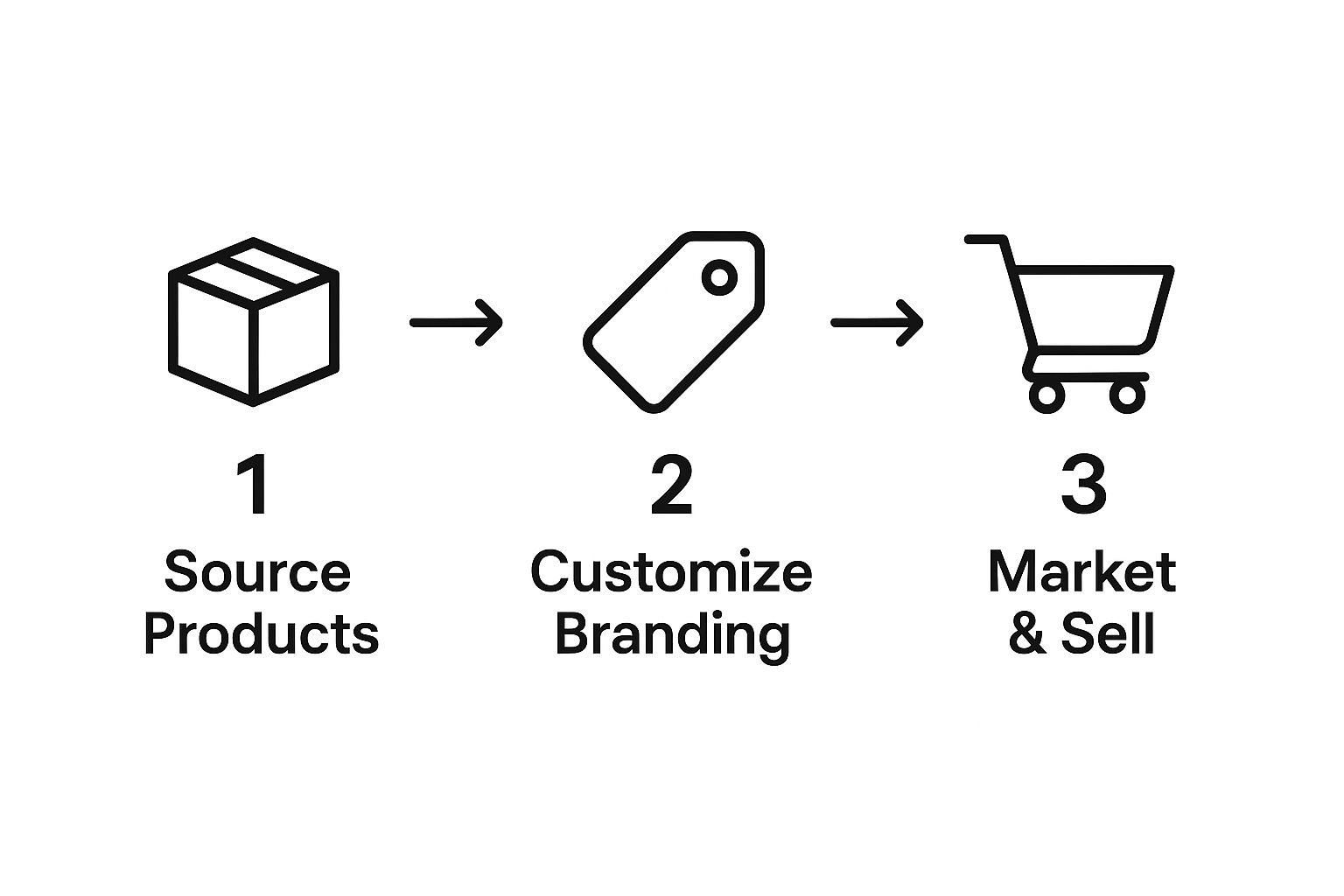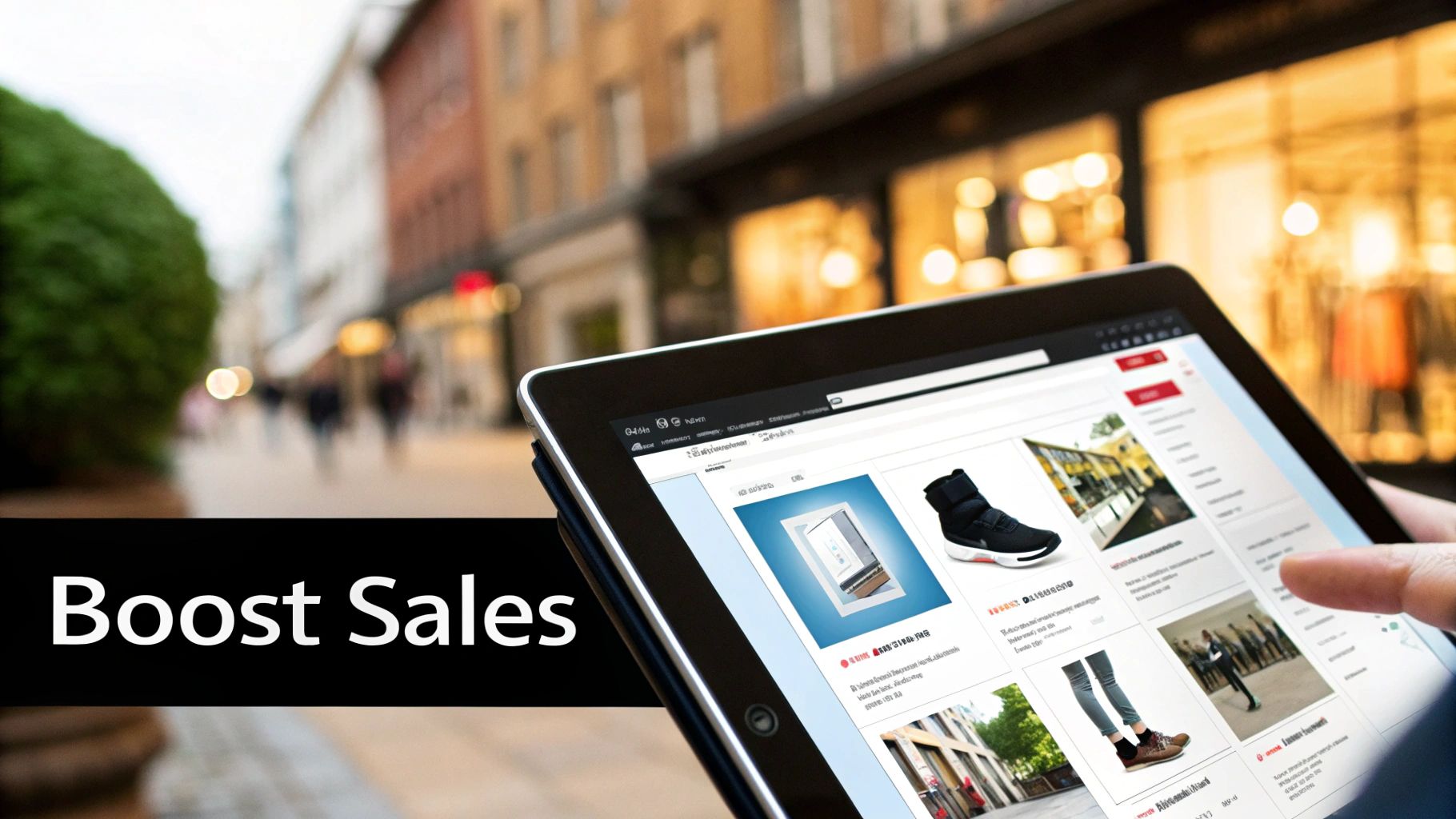Have you ever thought about selling a powerful tech product, but without the massive headache and expense of actually building it from the ground up? That’s the simple, brilliant idea behind white label reselling.
This model allows you to take a sophisticated, market-proven product—like an AI front desk—and put your own brand on it. It’s one of the fastest ways for entrepreneurs and agencies to launch a profitable tech business.

Starting a tech business from scratch is a huge undertaking. The costs for research, development, and engineering can be astronomical, especially in a competitive field like AI SaaS. This is exactly where the white label reseller model changes everything.
It’s your shortcut to the market. You get a fully developed, pre-vetted product that’s ready for your logo and your customers.
Instead of burning through your budget and time building and debugging software, you can jump straight to what you do best: marketing, selling, and building great customer relationships. While white label reselling is a fantastic approach, it's just one of many effective small business growth strategies you can explore.
The demand for tools that boost efficiency has never been higher. Small businesses are desperate for solutions like an AI front desk to handle their calls, book appointments, and convert leads—all without the cost of hiring more staff.
As a white label reseller, you’re not trying to create demand. You're plugging directly into it with a solution that works.
This isn’t just some fleeting trend; it’s a massive economic shift. The global private label market, a close relative of white label reselling, is set to explode to USD 1,623.4 billion by 2034. That's up from USD 915.1 billion in 2024.
This 5.9% compound annual growth rate is fueled by businesses and consumers who want quality and value without paying for a big brand name. It’s a huge opportunity waiting to be seized.
For anyone looking to start or scale a business with less risk, the advantages of the white label model are clear and compelling. It offers a strategic path to ownership that's both faster and more focused on growth.
Here’s a quick look at why this model is so attractive.
Ultimately, this model empowers you to focus on building a sustainable business around a solid product, letting the provider handle the complex tech in the background.
The real power of being a white label reseller is that you're not just selling a product; you're selling a solution under a brand that you control entirely. This creates long-term value and positions you as a trusted expert in your niche.
Picking your white label partner is probably the most important decision you'll make in this entire venture. Seriously. This single choice forms the bedrock of your new business, dictating everything from the quality of your service to your final profit margins. A great partner gives you wings; a bad one is an anchor.
This isn't about getting wowed by a slick sales pitch. It’s about doing your homework and diving deep into what they actually offer to make sure it lines up with your vision and, more importantly, what your future clients need. Think of it like a business marriage—you need reliability, support, and to be heading in the same direction to make it work.
The basic flow is simple enough: you find a solid product, slap your brand on it, and take it to market.

But that first step—choosing the partner—is what makes or breaks everything that follows.
Before you even start dreaming up brand names or pricing tiers, you have to kick the tires on the product itself. Is the AI front desk actually any good? Does it sound natural, or like a robot from a '90s movie? Can it genuinely solve the day-to-day problems of your ideal client, whether that’s a busy dental office or a local contractor who misses calls while on a job?
Get a full demo, but don't stop there. Insist on a trial or a sandbox account so you can play with it yourself. Make some test calls. Try to trip it up. This kind of hands-on testing is completely non-negotiable.
Here are the absolute must-checks:
Let's be clear: the whole reason you're doing this is to build your brand, not someone else's. A true white label partner understands this and gives you total control over the platform's look and feel. You're not just reselling a product; you're the owner of the brand your clients interact with.
At a minimum, your partner must let you:
A partnership that puts limits on your branding isn't a true white label program. It's just a glorified affiliate deal. Your customers should have absolutely no clue another company is powering the tech behind the scenes.
This is the fundamental promise of the white label model. It’s how tech providers expand their reach—by empowering entrepreneurs like you to be the face of the product. This creates a powerful, scalable business for the provider while you get to build your own brand equity and client base.
Picture this: your client has a technical glitch. Who do they call? You. They don't know (and shouldn't know) about the company behind the curtain. That means you need a partner who provides phenomenal, fast support to you. Your success is their success, and their support team should act like it.
Before you sign any contracts, get specific answers:
A top-tier partner acts as a silent extension of your own team. For instance, our white label program includes dedicated account managers and go-to-market advice to help you sidestep common mistakes and scale much faster. That level of hands-on support is often the difference between struggling on your own and growing confidently with a real team behind you.

Alright, you've got a powerful AI front desk solution from a partner you trust. Now comes the fun part: creating what your customers will actually see and experience. This is where white label resellers really get to shine. You’re not just moving a product; you’re building an identity that connects with clients and earns their trust. The whole point is to make your business memorable and instantly recognizable.
Your first step is landing on a business name that's catchy but also hints at what you do. Think along the lines of "Apex Automated Solutions" or "Peak Performance Reception." Names like these suggest efficiency and professionalism right from the get-go.
From there, it's all about defining your unique value proposition. Why should a swamped dental clinic or a local plumbing company pick you over anyone else? It’s not about rattling off AI features. It’s about selling the solution to their biggest headaches.
Instead of saying, "We offer an AI receptionist," frame it as, "We help you capture every single lead, so you never lose a job to a missed call again." See the difference? That problem-solving approach hits home with small business owners who are stretched thin and laser-focused on their bottom line.
Your messaging should hammer home these key pain points:
This messaging becomes the backbone of everything you create, from your website copy to your sales pitch. It’s what turns you from just another tech vendor into an indispensable problem-solver.
Your website is your single most important asset. It's the first place potential clients will go to check you out and figure out what you're all about. A professional, clean website isn't just nice to have; it's non-negotiable. It has to clearly state the value you provide and make it ridiculously easy for visitors to learn more or sign up.
Remember, your website isn’t just a brochure; it’s the virtual front door to your business. It must seamlessly integrate your white-labeled product, making it feel like a natural part of your brand.
Most white label platforms give you pretty straightforward ways to embed the service right into your site. This is usually done with an iframe or by pointing a custom domain to the platform’s backend. For some hands-on guidance, check out these detailed reseller tutorials. They can walk you through the steps for a flawless setup.
Don't forget your landing pages, either. They need to be hyper-focused on one thing: conversion. That means compelling headlines, crystal-clear calls-to-action, and social proof like testimonials. You might even have to offer a sweet deal to your first few clients to get those initial reviews. The goal is to build a brand that not only looks the part but actually works to turn curious visitors into paying customers.

Alright, let's talk about one of the most important decisions you'll make: setting your prices. This is where the rubber meets the road. It's a delicate dance between making your service attractive to clients and making sure your own business stays profitable and grows. The biggest mistake I see is people just trying to cover their costs. Don't do that. You need to price your service based on the massive value it brings to your clients.
Think about what an AI front desk actually does for a small business owner. It stops them from hemorrhaging money on missed calls. It frees up their team to do more important work. It captures new leads 24/7, even when they're asleep. This isn't just a minor convenience—it’s a direct boost to their bottom line. Your pricing has to reflect that.
This isn't just a hunch; the white-label model is booming in specialized fields for a reason. Take the pharmaceutical segment of the white-label market. It's projected to see a 7.9% CAGR, hitting a market size of $9.24 billion by 2028. That kind of growth shows how powerful this model is at meeting specific customer needs effectively. You can learn more about this trend and see the market growth data on whitelabelwonder.com.
When it comes to structuring your prices, you've got a few solid options. The key is to keep it simple. Your provider's wholesale rate is your floor, but the real magic happens when you package your service in a way that makes sense for your customers and your own profit goals.
Here are a few models that just plain work:
The most successful resellers I know don't just sell a product; they sell a solution. Think about packaging your tiers around solving a specific pain point. For example, a "Lead Capture" plan for your basic tier and a "Full Automation Suite" for your premium one.
Once you've picked a model, it’s time to crunch the numbers. Your profit margin is simple: take the retail price you want to charge and subtract the wholesale cost from your white-label partner. Make sure you aim for a healthy margin that leaves you room for marketing, support, and, you know, actually growing the business.
Next, do a little homework. Scope out what other AI receptionist services are charging. Don't just look at other white-label resellers; check out the big direct-to-consumer brands as well. Your goal isn't to be the cheapest guy on the block. It's to find a competitive price point that you can justify with the unique value and personal touch you bring to the table.
Alright, your business is set up, the pricing makes sense, and your brand is looking sharp. Now for the exciting part: landing those first paying customers. For white label resellers, this isn't about blasting a message to the world and hoping something sticks. It's about surgical precision—finding and connecting with the exact businesses that are desperate for a solution like an AI front desk.
Forget about generic ads. Your first push should be all about burrowing into local and niche online communities where small business owners actually hang out. This is where you'll build real trust and show them what you can do.
Think about the businesses in your own backyard. Local service providers—plumbers, electricians, dentists, law firms—are your sweet spot. These are people who are often drowning in the day-to-day grind, and every single missed call is a stab of pain they feel directly. The best way to get in front of them is to become the go-to expert right where they live and work.
You need to focus your content on solving their specific problems. Don't write about "the power of AI." Instead, write a blog post titled, "How a Dental Office Can Stop Missing New Patient Calls." That kind of targeted content does more than just attract the right people; it immediately positions you as an authority who understands their world.
Your game plan should include:
The goal isn’t to shout from the rooftops. It’s to whisper in the right person’s ear. A single, well-placed post in a legal association's online forum can be more powerful than a dozen generic ads.
Once you’ve got a prospect’s attention, the product demo is where the magic happens. This is your chance to make the AI front desk feel less like another piece of software and more like their next star employee. A great demo doesn't just list features; it tells a story of transformation.
Show them, don't just tell them. Pinpoint their number one problem and demonstrate exactly how your service solves it. Are they complaining about missed calls after hours? Run a live test call and let them see the AI flawlessly capture a new lead's information. Is appointment scheduling a nightmare? Show them how a client can book a time slot in seconds, just by talking on the phone. Make it real.
This hands-on approach builds a mountain of trust. When a business owner physically sees the tool solving their specific pain point, the value becomes impossible to ignore.
Let's be honest, cold outreach can feel like a slog. But a little personalization goes a long, long way. Do your homework. Before you hit send, find something specific about their business. Maybe you noticed on their website that they don't have an online booking option, or you saw a Google review that mentioned long hold times.
Here’s a simple, effective outreach structure that cuts through the noise:
Even if you're just starting out, you can build powerful case studies. Offer your first few clients a significant discount in exchange for a detailed testimonial and some performance data. Their success stories will become your most potent marketing weapon, proving that your solution delivers real-world results.
When you're ready to get those new clients signed up, you can use a simple reseller registration process to get them onboarded quickly and efficiently.
Jumping into the world of white label reselling is exciting, but let's be honest, it usually brings up a ton of questions. Getting straight answers is the only way to move forward with confidence and build a real business on a solid foundation.
So, let's get right to it. Here are the most common questions we hear from people just like you.
Yes, it absolutely can be. The math is simple: your profit is the difference between the wholesale price you pay us and the retail price you charge your clients.
You get to skip all the massive upfront costs. Forget about R&D, core engineering, or server maintenance—that's all on us. Your overhead is a tiny fraction of what a typical software company deals with.
Your success comes down to a few key things: picking a service people actually need, marketing it well, and pricing it based on the value it provides. Think about it: if your AI front desk saves a small business from hiring a full-time receptionist, you're saving them thousands of dollars a month. Suddenly, your service isn't a cost; it's an incredible investment.
You don’t need to be a developer. Let me say that again: you do not need to know how to code.
Your role is all about marketing, sales, and building great client relationships. The white label provider—that's us—handles all the heavy lifting. The software development, the updates, the bug fixes, and keeping the lights on... it's all our responsibility.
What you do need is to become a master of the product you're selling. You have to know it inside and out—every feature, every benefit, and exactly how it solves your clients' biggest headaches. Your job is to be the product expert, not the product builder. To see just how straightforward the setup is, check out our guide on how to sign up as a white label reseller for My AI Front Desk.
The resellers who crush it are the ones who become obsessed with their niche. They understand their clients' industries so deeply that they can perfectly explain how their branded AI solution solves that industry's most painful problems.
When you partner with us, you're getting just that—a partner. We believe our success is tied to yours, so our support goes way beyond a generic helpdesk email.
A true partnership means you get comprehensive support designed to help you win. Here’s what you should look for (and what we provide):
Before you commit to any white label provider, get crystal clear on the support they offer. This partnership is the engine of your new business, so make sure they're as invested in your growth as you are.
Ready to launch your own branded AI service? With My AI Front Desk, you get a powerful, ready-to-sell platform backed by expert support to help you scale. Explore our white label program and start building your business today at https://myaifrontdesk.com.
Start your free trial for My AI Front Desk today, it takes minutes to setup!








